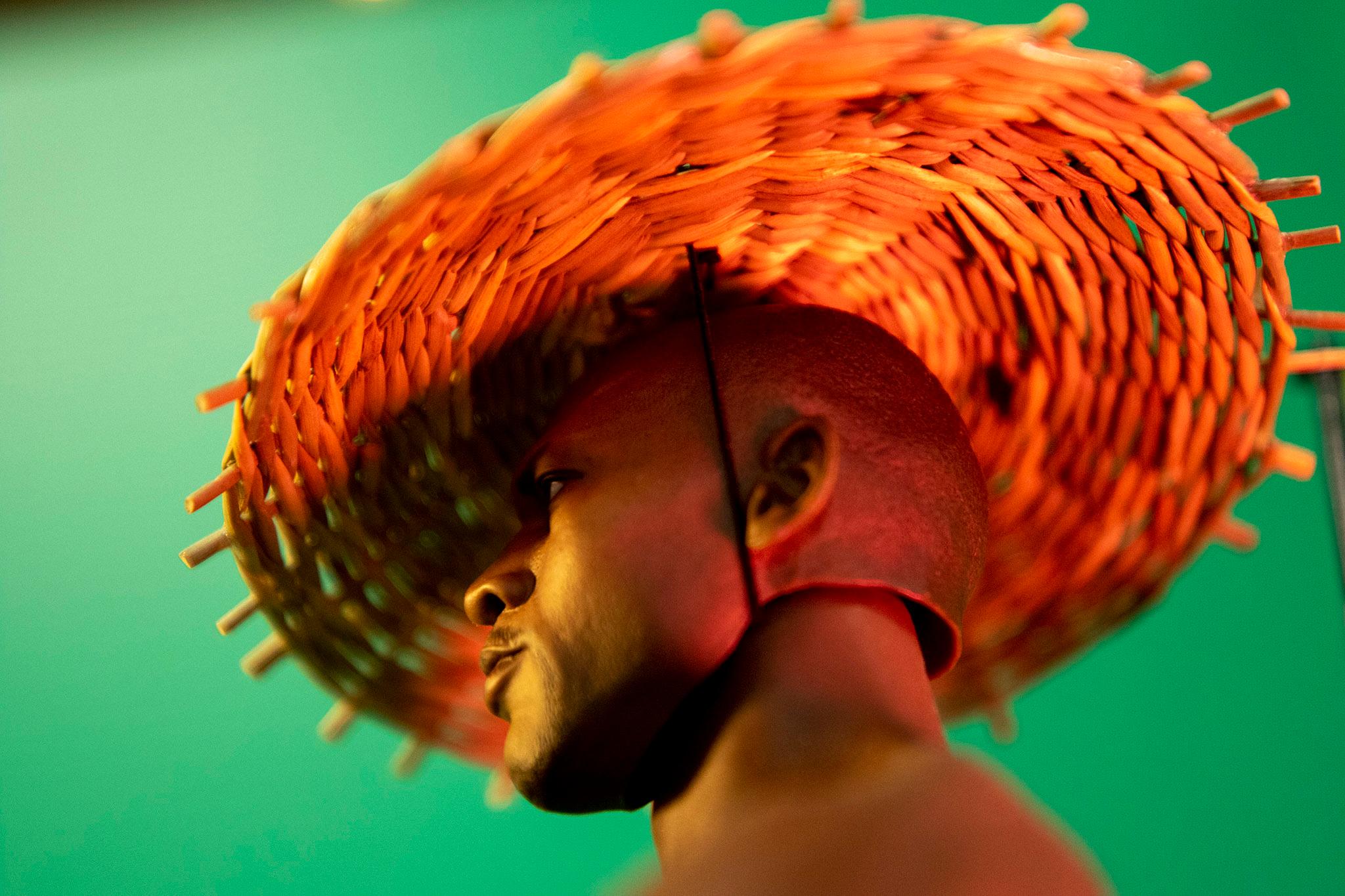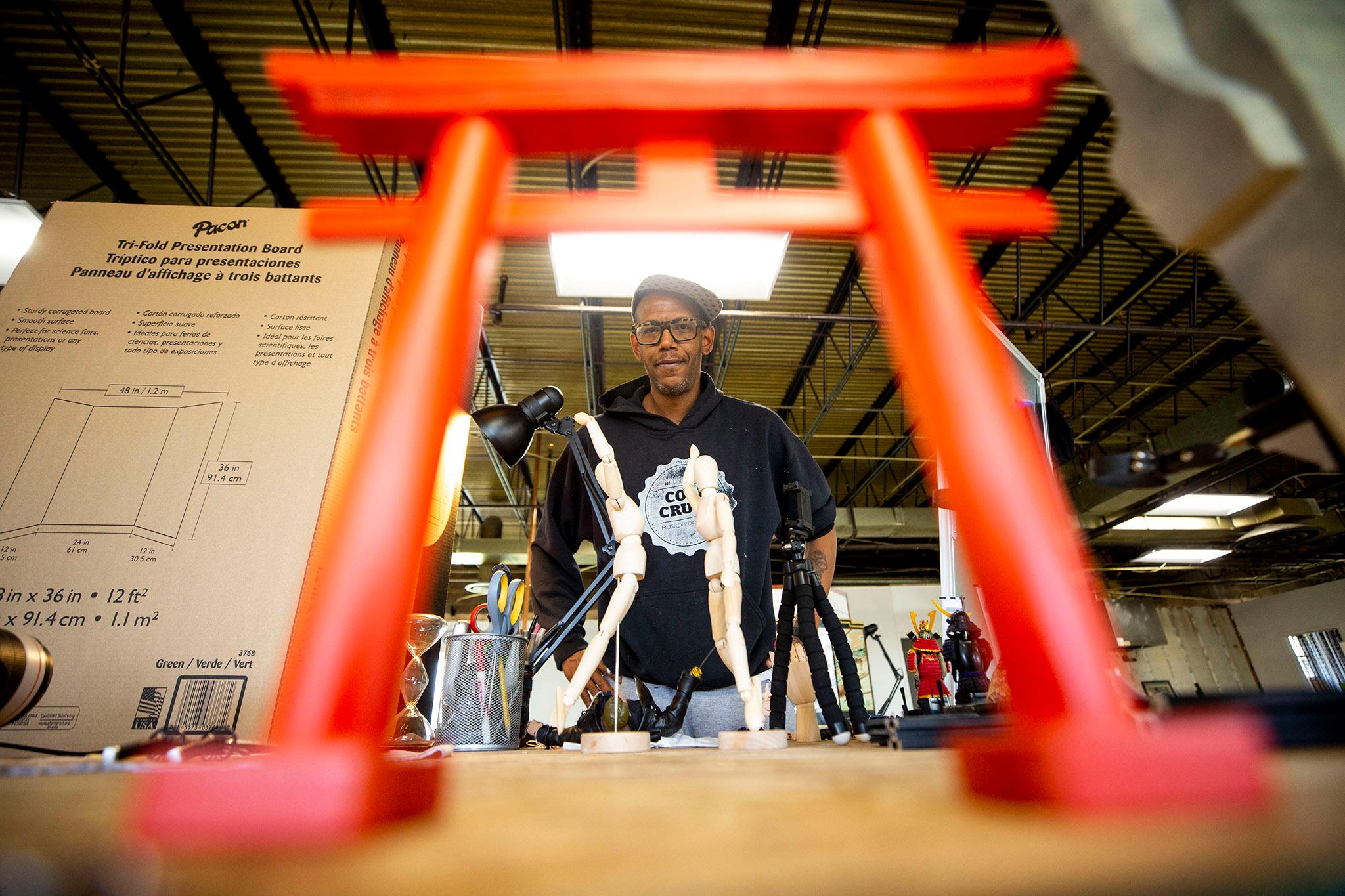On a Thursday afternoon, in a warehouse space in Globeville, Musa Bailey sits playing with action figures.
Before him stands a tiny Michael Jordan figure wearing a woven sun hat. Tiny Michael Jordan is crossing swords with a tiny masked ninja, and both of them stand on a sort of miniature film set, backdropped with a tiny green screen. Lined up in rows around this miniature set are model parts, like replacement hands, nunchucks and swords.
Arranged around the lofty room are homages to samurai film -- paintings, weapons, a scale model of a Shinto shrine. The walls, too, are covered in samurai imagery, as well as photos of Bailey with his 7-year-old son, Glen.
"That's the best way I work, is I have to completely immerse myself," Bailey said.

Bailey is a musician, and as of only recently, a filmmaker. He used to be a DJ, but he's ready to leave that life behind for something completely new: a stop motion samurai film called Assassin With Son.
"I'm looking at this as my sort of midlife crisis/pivot/career change. Because I've been a DJ for like 25 years. I've been doing that a really long time," he said. "And it doesn't really vibe well with being a dad. Late nights, and being out and partying and all of that, it's just taken a toll on me."
Bailey says his best friend died a few years ago in a motorcycle accident, and that he's lost a few more friends to suicide. Bailey has also been dealing with trauma from the shooting that killed rapper Tyrone Adair Jr outside of the nightclub Cold Crush, where Bailey used to work. On top of all of that, Bailey was also responsible for another person: Glen.
"The first two years of his life, I was just praying he didn't die," Bailey said. "Every day I was like, please don't die today, bro! Don't eat anything on accident, don't fall off of something. It is nerve racking."

Last year, Bailey was working to start a new chapter in his life, to get out of DJing. He started renting out a house on Airbnb and said it was going well.
"I was finally happy. I was like, alright, I don't have to DJ anymore. I can just do Airbnb and make a ton of money and go on vacation every year. And then the pandemic hit."
Bailey said he lost everything: "I had to restructure my whole life."
In quarantine, there was nothing to do and nowhere to go. Bailey decided to look for a fun new project to sink his teeth into. He'd long been a fan of samurai films and decided to make a mixtape influenced by Japanese music: a soundtrack with movements that would convey a father-son narrative. He pulled obscure samples from samurai films and set them to his own beats.
"Japanese music is super-funky. It's not like other international music. It's in kind of the same scale and tuning as pop and American music. So when you blend it with other sounds, it's not in some weird key," Bailey said. "That was fun, to find out how easy Japanese music works with American rock and roll. "
Bailey had always been a film buff, and as the pandemic progressed, the mixtape evolved into a film expanding upon the narrative he'd told in the mixtape. It'd be a mixed media, stop motion film using bendable action figures as characters, including the Michael Jordan one. The film was for Glen, Bailey said, and something he could do with his son during the pandemic, without the pressure to entertain that he felt while DJing.
Some aspects of this pivot felt natural to Bailey. He remembers growing up fascinated by Rankin/Bass stop motion Christmas films. As a child, he wondered how they worked, and how they'd made Rudolph's nose glow. He said he also loved to play with models growing up.
"I was building full on Star Wars action scenes, bombers and rockets. I was super-nerdy," Bailey said. "I was already kind of crafty. So it was easy to kind of make this transition. "
Still, Bailey hadn't studied film and had never made a film before. He's now learning on the go, reading film books and taking masterclasses online. He's leaning hard into the pivot and even started a film production company called Overseer Price with his brother, Ra Bailey.
"Trying this is all brand new. I'm not good at it. And that's what makes it so much f****** fun," Bailey said. "I don't care, really, if it sucks. I think when you get good at something, you start to really care. But right now, if this is a complete flop, and no one likes it, at least I tried something. And then the next thing I do will be b*****."

The story depicted in the film is a true one. It's also complete fantasy.
In it, a miniature samurai version of Bailey fends off ninjas and bad guys, fighting to protect a miniature Glen. Bailey said the film is a parallel universe version of his relationship with his son, one that conveys some of the struggles they've been through using samurai motifs.
"We don't actually have to fight ninjas, and we're not being attacked constantly," he said.
But the world feels like it's coming down on Bailey sometimes.
"The ninjas are the world," he said. "The ninjas are the bad energy and racism and all those things that I'm fighting in my real life. But here, racism is ninjas."
Bailey has always loved samurai films. He loves the artistry and how beautiful the classic ones were, despite being in black and white. He loved the cinematography, which he said was ahead of its time, incorporating techniques that Hollywood only adopted years later. And he loved the stories: the simple good versus evil narratives driven by heroes with strong moral compasses who, despite facing adversity, were certain to come out on top in the end. Bailey identifies with the classic samurai arc.
"I'm not a killer, but I have a survival instinct that's really keen and sharp," Bailey said. "It's not so much about killing, it's about surviving. Surviving people attacking you, surviving things coming at you."

Also, the samurai always wins.
"This is my way of doing something about it, is creating this fantasy world where I am unstoppable, where I can't be defeated. And that gives me, oddly, enough confidence, being a dad," Bailey said. "Because he sees me working on this project, and he knows it's us. He's not confused about who this is about. So hopefully, that'll translate to him, just the strength of being a dad and how important your kids are."

Bailey said he was inspired to create the film by seeing a lack of representation of good dads on screen, and particularly good Black dads.
"There's just not a lot of stories where the main character is a Black dad and he is not a drug addict or not, 'Oh, I just got into jail. Don't be like me!'" he said. "That story was getting really exhausting to me. So I wanted to tell a story about Black fatherhood that was about not only how difficult and challenging it is, but how many Black dads are just quietly just doing the best job ever. And they don't get any credit for it."
Like, for instance, Bailey's own father.
"I know how hard he worked to keep things going for us, and he never wanted credit for it," Bailey said. "He's just one of those guys that just doesn't need praise. But I think that dads do need some praise every now and then."
Bailey hopes this project will be a memory Glen can hold onto, that he might look back on as something cool his dad did for him.
"I would hope that people can start to see that Black fatherhood is more complex than, they just run off and you never saw him again," he said. "You don't hear as many stories of the Black dad who just was at their college graduation and was there for their first date. I wanted to tell a story that kind of got rid of some of those stereotypes."

Bailey knew he wanted his film to incorporate samurai tropes and imagery. He also knew that, as someone who isn't Japanese, it would take a lot of sensitivity to do that.
"Initially, I was worried about this not being authentic and it coming off kind of culture vulture-y," Bailey said. "It's this real slippery slope when you're trying to tell stories using other cultures' clothing and practices and rituals."
He made a point of involving Japanese people, building a system of checks and balances. The end product will be a narrative informed by elements of Japanese culture, as well as an homage to it.
"Culturally, Black people and Asians have had awkward history," Bailey said. "And so this is a really cool bridge to start maybe addressing some of those issues, but also just admiring how many things we love from each other "
Bailey spoke to his friend Courtney Ozaki, a local Denver artist and the founder of the Japanese Arts Network, who he said will be an executive producer on the project. She helped Bailey find a Japanese calligrapher to write the title of the film, which will be used in promotions for the film. Bailey said it was important to him to work with a professional calligrapher.
"It's like the people who get those Japanese tattoos that don't say the right thing," Bailey said. "The tattoo guy told you it says 'peace,' but it really says, like, 'fried chicken' or something like that. I didn't want to be that guy."
Casey Kawaguchi, a well known and acclaimed Denver artist and muralist, designed the concept art for the film. Bailey also started taking Kendo, a Japanese style of fighting using two-handed swords. He's learned how to properly hold the sword, as well as the movements, techniques and ceremonies specific to Kendo. He said that knowledge has helped him to more accurately portray Kendo fighting with his figurines.

He hopes through this film that people will see how powerful cross-cultural projects can be.
"Working with people in a different racial group or ethnicity, and everyone respecting each other's uniqueness, is what's going to make this really cool," Bailey said. "It can be done thoughtfully and without being offensive and without appropriating anything. You can literally show tribute to the things that you love and it not be some rip off of something."
Assassin With Son is in the pre-production stage.
Bailey is building a team of set designers, cinematographers and other professionals, including a fabricator who'll sew tiny costumes for the stop-motion figures. On June 1 he's launching a Kickstarter to help raise money for production, which he hopes to wrap by next year.
In the meantime, Bailey is practicing with model figures, staging them in their miniature set and using Dragonframe, a stop-motion software, to capture their broken movements with his phone. He's learned that it takes hours to film just a minute of stop motion. Animation would have cost a lot of money. Stop motion costs a lot of time.


Glen does "creative consulting" on the film, offering up ideas for set design. Bailey said it was Glen's idea to put the hat on Michael Jordan.
"He thinks this is fun, because he does it anyway," Bailey said. "When we're at home, he has Spider Man versus Hulk. And he's smashing them against each other. His imagination is already doing this."
He said he showed Glen a clip of his practice shots: a fight scene between Michael Jordan-Bailey and a ninja.
"He's like, that looks cool, and it was, like, the proudest moment in time," Bailey said. "Because if he thinks this looks cool, I don't really give a s*** with anyone else. If the movie works for him, then I'll be happy."












